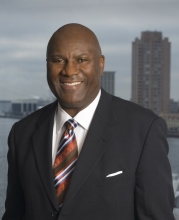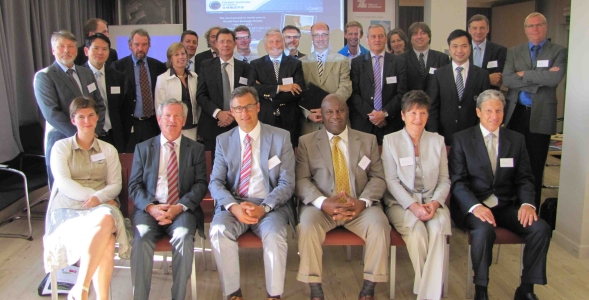JOACHIM COENS PORT OF ZEEBRUGGE: INVESTING IN HINTERLAND CONNECTIVITY
The port of Zeebrugge has an ideal location to serve the markets of continental Europe as well as the British Isles. It is a young seaport with modern port equipment suitable for the largest ships. The present structure of the port dates from as recent as 1985. The emergence of the roll-on/roll-off techniques, the containerisation and the increase in the scale of the ships convinced the Belgian government in the seventies to develop the coastal port into a deep sea port. An extensive outer port, a new sea lock with entrance to an inner port gave Zeebrugge new impulses in the years that followed. As a result, total cargo traffic tripled from 14 million tonnes in 1985 to 43.5 million tonnes in 2014.
This cargo needs to be transported free of congestion to the customers in the European Hinterland. In order to safeguard this fluent cargo traffic, the inland connections need to be optimized constantly. The port authority together with the responsible bodies continually see to it that maritime access and connections by road, rail and inland navigation are able to ensure the mobility of the present and the future cargo volumes.
INVESTING IN HINTERLAND CONNECTIVITY PRESENTATION
[dopts id=”182″]
CLICK IMAGE TO VIEW PRESENTATION

JOACHIM COENS
Chairman-Managing Director
Port Authority Bruges-Zeebrugge
Belgium
_____________________
CHAIRMAN
GLOBAL INSTITUTE OF LOGISTICS
EUROPE CHAPTER
BIOBRAPHY:
Mr Joachim Coens was born in Bruges on 6 September 1966; he is married and has two daughters, Sofie and Anna and two sons, Felix and Victor. He is a reserve officer of the Belgian Navy. After his secondary studies in Bruges, he graduated as civil engineer (construction) at the University of Louvain (Belgium) and specialised at the Technical University of Delft (the Netherlands).He started his professional career as supervisor of several harbour building projects in the Middle East (UAE) for the Besix Group and was responsible for project developments in Eastern Europe. Since 1995 he has been alderman for finances and public works of the city of Damme, where he now holds the position of first alderman, responsible for culture and local economy. In May 1995, he was also elected as a Representative in the Flemish Parliament, where he seated in several commissions, mostly with a connotation of Environment, Finances, Culture, Public Works, Mobility and Energy. He resigned from this on 15 March 2001, in order to be appointed as Chairman-Managing Director of the Bruges-Zeebrugge Port Authority.
JERRY A. BRIDGES PORT OF VIRGINIA : THE CASE FOR VIRGINIA
The Port of Virginia focuses on what matters most to our customers, our people, and our region. Every day we deliver superior service, safe transport, and continuous improvement. It’s why we get up in the morning, and why The Port of Virginia will keep moving forward. Cargo moving through our world-class facilities is transported from and to markets around the globe, carrying the goods and supplies that manufacturers, corporations, and individual consumers use in their everyday lives. This cargo is moved by way of: 6 Terminals, 1,864 acres, 19,885 L.F. of berth, Up to 50’ deep berths and 30 miles of on-dock rail
THE CASE FOR VIRGINIA PRESENTATION
[dopts id=”201″]
CLICK IMAGE TO VIEW PRESENTATION

JERRY BRIDGES
Executive Director Virginia Port Authority
Virginia
United States of America
_________________
CHAIRMAN
GLOBAL INSTITUTE OF LOGISTICS
NORTH AMERICA CHAPTER
BIOBRAPHY:
Jerry A. Bridges was appointed Executive Director of the Virginia Port Authority (VPA) by the Board of Commissioners and officially took office on February 5, 2007. Mr. Bridges is responsible for the broad programmatic areas of marketing, development, finance and promotion of Virginia’s marine terminal facilities located in the Hampton Roads harbor – Newport News Marine Terminal, Norfolk International Terminals, Portsmouth Marine Terminal, APMT Virginia, and the Virginia Inland Port located in Warren County, Virginia. The Virginia Port Authority (VPA) stimulates economic activity in the Commonwealth of Virginia by promoting the shipment of cargoes through state-owned terminals. Prior to Mr. Bridges’ arrival at the VPA, he served as Executive Director of the Port of Oakland. He also served as the Area Vice President, Northern California for Marine Terminals Corporation. In addition, Mr. Bridges held various operating positions with Sea Land Services and Roadway Express. Mr. Bridges currently serves on several business, civic, academic and maritime related boards and organizations. Mr. Bridges also served 20 years as an officer in the U.S. Marine Corps in active reserve status and holds a Bachelor of Science Degree in Social Sciences from the Appalachian State University in Boone, North Carolina.
KIERAN RING CEO GIL: HHLA HAMBURG CONTAINER TERMINAL QUALITY SYSTEM
Since the launch of CTQI (Container Terminal Quality Indicator) in 2008 and the subsequent certification of the first terminal, CTA in Hamburg, the Global Institute of Logistics have been monitoring the effect of implementing the CTQI. It is not just a proven tool to demonstrate ‘best in class’ status, but also a continuous improvement tool which may be implemented at any terminal with, or without, CTQI certification. CTA, already one of the most efficient terminals in the world, has seen enhancements in productivity and efficiency through the implementation of the CTQI and the use of the key performance indicators to identify and rectify bottlenecks and problem areas. These improvements have returned an on-going financial benefit to the terminal. We believe this benefit can be replicated elsewhere at other container terminals, and we refer to this programme for continuous improvement as the Container Terminal Quality System.
HHLA HAMBURG CONTAINER TERMINAL QUALITY SYSTEM PRESENTATION
[dopts id=”12″]
CLICK IMAGE TO VIEW PRESENTATION

Kieran Ring
CEO
Global Institute
of Logistics __________________
BIOGRAPHY:
Kieran Ring is the Chief Executive Officer of the Global Institute of Logistics which he founded in 2003 with members of the Global Logistics Forum under the Chairmanship of the late Robert V. Delaney (Bob), the renowned US author and logistician. Kieran began his career in the early 1980s working as an industrial engineer in the European multinational manufacturing sector. By the late 1980s he was working as a publisher in the trade, technical and scientific media where he was directly responsible for journals and magazines, which documented the rise of foreign direct investment (FDI). In 1989 he was appointed Deputy Publisher to the Paris-based Eurexpansion Group with responsibility for Ireland’s ‘Sunday Business Post’. In 1995 he was appointed Executive Director of the European Institute of Transport.
KIERAN RING GIL: END USER MARKETING FOR CONTAINER TERMINALS
Yantian International Container Terminals (YICT) is the world’s largest single container terminal and are champions of “Joined Up Thinking” and have built their cargo volumes through marketing directly to cargo-owners a strategy they called ‘End User Marketing’. For approximately the first three years of its existence, Yantian International Container Terminals principal competition ironically came from its parent companies HPH’s own Hong Kong ports. YICT had to persuade ship-owners to use the new Yantian port rather than continue to direct all their regional business through Hong Kong. It eventually did this through marketing directly to cargo-owners (‘end users’), an innovation for the port industry. YICT is regarded as the first container terminal operator to deploy an End User Marketing strategy. The driver for this is that Beneficial Cargo Owners (BCO’s) do not have contractual relationship with any of stakeholders inside the port, leading to a dependence on third parties for status reports etc. This can lead to misreporting and guessing about the status of a particular container. This is mitigated by container terminal operators liaising directly with BCO’s and their 3PL’s. BCO’s report that direct relationships with container terminal operators has led directly to greater Visibility, increased Velocity and added Value add in their container logistics processes. For terminal operators direct relationships with their end user had a direct influence on decisions by shipping lines to include their terminal on their network maps. Shipping lines are heavily influenced by their upstream customers − the port’s end users.
YICT CASE STUDY PRESENTATION
The YICT approach to collaboration has also lead to logistics innovation particularly in the area of “Port Centric Logistics” which again the terminal is credited with innovating. Port Centric Logistics has grown to become a vital part of global supply chain strategy today and was born in Shenzhen out of this dynamic and continues to proliferate globally, DP World’s $2.5 Billion Dollar development London Gateway in the U.K. is built on a port centric model.
[dopts id=”205″]
CLICK IMAGE TO VIEW PRESENTATION
After researching how container terminals across the world compared with YICT it became evident that they had first mover advantage and as such were identified as the benchmark in container terminal operation globally. This led to accreditation of YICT as the the Worlds “Best in Class” Container Terminal by the Institute. In recognising YICT, the Institute is underlying the importance of the continuing and expanding co-operation between end users and container terminal operators to make the port centric logistics process more efficient.

Kieran Ring
CEO
Global Institute
of Logistics __________________
BIOGRAPHY:
Kieran Ring is the Chief Executive Officer of the Global Institute of Logistics which he founded in 2003 with members of the Global Logistics Forum under the Chairmanship of the late Robert V. Delaney (Bob), the renowned US author and logistician. Kieran began his career in the early 1980s working as an industrial engineer in the European multinational manufacturing sector. By the late 1980s he was working as a publisher in the trade, technical and scientific media where he was directly responsible for journals and magazines, which documented the rise of foreign direct investment (FDI). In 1989 he was appointed Deputy Publisher to the Paris-based Eurexpansion Group with responsibility for Ireland’s ‘Sunday Business Post’. In 1995 he was appointed Executive Director of the European Institute of Transport.
YANG LEI (WILLIAM) GIL: DELIVER CHINA
The global maritime logistics industry has boomed on the back of China’s entry to the world economic trading system and its emergence as the factory of the world. For the most part, the logistics boom has been built on exports, with a large percentage of containers returning east from the west empty or at best filled with waste and other recyclable materials. However, the prosperity created by this first export-led era of Chinese globalization has started to stimulate the emergence of a growing middle class who are developing a very healthy appetite for “western” products. This, combined with a weakening dollar and euro, has meant that for the first time in the modern era China imported more than it exported in the first full quarter of 2010. A new opportunity is therefore emerging for foreign companies to enter the Chinese market, with significant ramifications also for global container trade flows and balances.In response to these developments GIL has began a research and networking program “Deliver China”.
DELIVER CHINA PRESENTATION
The Global Institute of Logistics’ Deliver China research program, through its Global China Import Council in partner shipment with DCH Logistics aims to build a transferable model based on “Best in Class” benchmarking that when implemented will allow global shippers and brand owners to successfully understand, entering and be continuing success in the Chinese market.
[dopts id=”203″]
CLICK IMAGE TO VIEW PRESENTATION

YANG LEI
China Director
Global Institute of Logistics
______________________
BIOBRAPHY:
Born and now based in Beijing, Mr. Yang Lei (William) was appointed the Institute’s China Director in September 2010. William leads the Institute’s China Taskforce under the chairmanship of Dr FU Yuning of China Merchant Group, which is charged with the responsibility of overseeing the transfer of logistics best practice east to west and west to east, and of stimulating joint Trade Development Programs between Chinese and global port communities.
William began his career working as a Researcher for the Institute, and is the author of “Reasoning and Methodology for the Creation of a Global Standard for Port Performance in Container Terminal Operations” in which he set out the academic argument that led to the development of the Institute’s Container Terminal Quality System (CTQS).He subsequently worked in the Freight Forwarding industry in Europe as a Marketing specialist, and was awarded the “Rising Star of Freight” by International Freight Weekly (IFW) in 2010 for his argument on the need for a Fixed Exchange Rate System to avoid freight pricing uncertainty against a backdrop of exchange rate fluctuation. Mr. Yang Lei holds a Bachelors Degree (BA) in Business Management and a Masters Degree (MBS) in Supply Chain Management from University College Dublin.
DAVID KUK DCH LOGISTICS: CHINA AS AN EXPORT MARKET
With a population of over 1.3 billion, China is the biggest country in the world. Its consumer market has the potential to be larger than that of North America and Western Europe combined. According to the Chinese Government’s 12th Five Year Plan, China is transforming itself from the global factory for the production of low-end products to producing high value added products and from an exporting economy to a large consuming market. In order to respond to such a requirement, the GIL has started a new import orientated research project combining the power of logistics, distribution and market research.
CHINA AS AN EXPORT MARKET PRESENTATION
[dopts id=”202″]
CLICK IMAGE TO VIEW PRESENTATION

MR. DAVID KUK
MANAGING DIRECTOR
DCH Logistics Company Limited
Europe
_____________________
BIOGRAPHY:
Mr. David Kuk has served as the Managing Director of DCH Logistics Company Limited, Third Party Logistics specialist for food, beverage, household products and repacking operation in Hong Kong, Macau and Mainland China. Mr. Kuk also is a Council member of Hong Kong Logistics Development Council, Committee member of Hong Kong Trade Development Council – Logistics Services Advisory Committee and Vice-Chairman of Logistics Association (Jiangmen) in China. He is also responsible for setting up the all DCH Logistics Hubs in China and developing strategic plan for Third Party Logistics in China. Mr. Kuk was the Warehousing and Distribution Manager for Wellcome supermarket Chains in 1978 to 1994. In Mid 1994, he was seconded to Australia as the Logistics Manager of Franklins Supermarket Chains. Mr Kuk has more than 30 years of supply chain management experience in Logistics business
YANG LEI (WILLIAM) GIL: THE ROLE OF SEAPORTS IN CHINESE OFDI
At the Global Institute of Logistics we believe that there is potential for world ports to cooperate on zoning part of their ports as China Gateways, to assist both import and export trade with China. China’s manufacturing might is well known, and has been the driving force behind the surge of Chinese exports. In seeking to balance its import/export trade, the Chinese government’s 12th Five Year Plan will raise the income of a third of the Chinese population, leading to the creation of a new ‘middle class’ and a whole new body of consumers. In addition, the 12th Five Year Plan will encourage Chinese companies to ‘Go Global’. These developments, in addition to the Chinese government’s commitment of $2 Trillion for Outward Foreign Direct Investment (OFDI), represent significant opportunities for the ‘China Gateway’ concept.
DELIVER CHINA PRESENTATION
The Global Institute of Logistics’ Deliver China research program, through its Global China Import Council in partner shipment with DCH Logistics aims to build a transferable model based on “Best in Class” benchmarking that when implemented will allow global shippers and brand owners to successfully understand, entering and be continuing success in the Chinese market.
[dopts id=”204″]
CLICK IMAGE TO VIEW PRESENTATION

YANG LEI
China Director
Global Institute of Logistics
______________________
BIOBRAPHY:
Born and now based in Beijing, Mr. Yang Lei (William) was appointed the Institute’s China Director in September 2010. William leads the Institute’s China Taskforce under the chairmanship of Dr FU Yuning of China Merchant Group, which is charged with the responsibility of overseeing the transfer of logistics best practice east to west and west to east, and of stimulating joint Trade Development Programs between Chinese and global port communities.
William began his career working as a Researcher for the Institute, and is the author of “Reasoning and Methodology for the Creation of a Global Standard for Port Performance in Container Terminal Operations” in which he set out the academic argument that led to the development of the Institute’s Container Terminal Quality System (CTQS).He subsequently worked in the Freight Forwarding industry in Europe as a Marketing specialist, and was awarded the “Rising Star of Freight” by International Freight Weekly (IFW) in 2010 for his argument on the need for a Fixed Exchange Rate System to avoid freight pricing uncertainty against a backdrop of exchange rate fluctuation. Mr. Yang Lei holds a Bachelors Degree (BA) in Business Management and a Masters Degree (MBS) in Supply Chain Management from University College Dublin.









